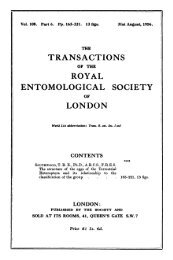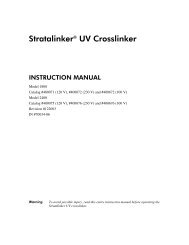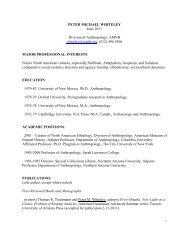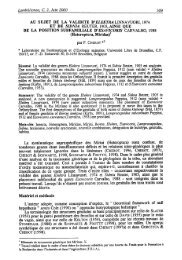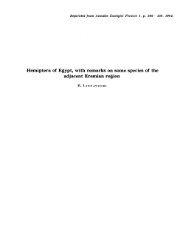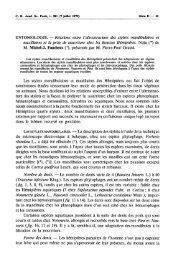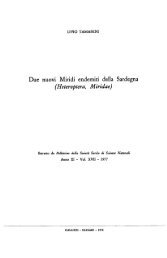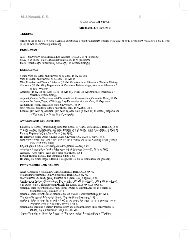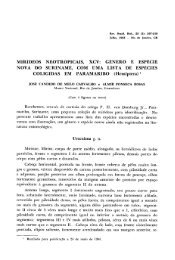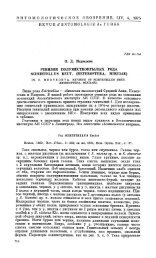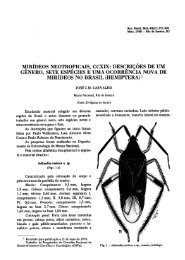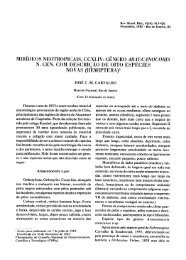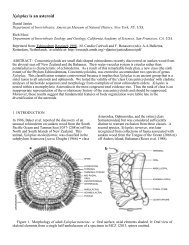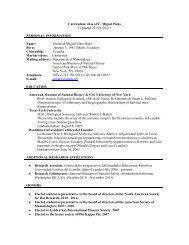Malcolm Carnegie McKenna, 77, Paleontologist - AMNH Research ...
Malcolm Carnegie McKenna, 77, Paleontologist - AMNH Research ...
Malcolm Carnegie McKenna, 77, Paleontologist - AMNH Research ...
Create successful ePaper yourself
Turn your PDF publications into a flip-book with our unique Google optimized e-Paper software.
<strong>Malcolm</strong> <strong>Carnegie</strong> <strong>McKenna</strong>, <strong>77</strong>, <strong>Paleontologist</strong><br />
<strong>Malcolm</strong> <strong>Carnegie</strong> <strong>McKenna</strong>, Frick Curator Emeritus at the American Museum of Natural<br />
History, and Professor Emeritus of Earth and Environmental Sciences at Columbia University,<br />
died on March 3 in Boulder, Colo. He was <strong>77</strong>.<br />
The author of hundreds of research papers collected in over a dozen volumes, Dr. <strong>McKenna</strong> was<br />
a world-renowned and influential paleontologist. He specialized in the history of mammalian<br />
evolution, but also published interdisciplinary work in cosmology, astrophysics, geology and<br />
molecular biology. He spent his 41-year career at the American Museum of Natural History in<br />
New York City. After retirement, he had adjunct positions at the University of Colorado and the<br />
University of Wyoming.<br />
A Fellow of New York's Explorers Club, Dr. <strong>McKenna</strong> organized annual American Museum<br />
field expeditions to the western United States, Patagonia, the Andes, China, Mongolia,<br />
Greenland and the Canadian Arctic. He taught and mentored over 30 Ph.D. students in<br />
paleontology. The prominent evolutionist and writer Stephen Jay Gould once said that<br />
everything he ever learned about mammals, he learned from <strong>Malcolm</strong> <strong>McKenna</strong>.
<strong>McKenna</strong> was awarded the Romer-Simpson Medal of the Society of Vertebrate <strong>Paleontologist</strong>s<br />
in 2001, and the Gold Medal of the Paleontological Society of America in 1992, the top honors<br />
in his profession.<br />
<strong>McKenna</strong> was a proponent of a new classification paradigm, called cladistics, introduced in the<br />
1960s. Through his affiliation with Columbia's Lamont-Doherty Lab, he was also an early<br />
supporter of continental drift theory, not yet widely accepted until after magnetic data of ocean<br />
floor samples were analyzed. He delighted most in interdisciplinary studies and exhorted his<br />
students and colleagues to synthesize knowledge as much as specialize in it.<br />
In 1964, at the height of the cold war, he visited Mongolia as a tourist in order to arrange for the<br />
resumption of field work in the Gobi Desert initiated by the American Museum's expeditions of<br />
the 1920s that were led by Roy Chapman Andrews and subsidized in part by Childs and Henry<br />
Clay Frick. These museum expeditions were finally resumed in the 1990s, resulting in<br />
remarkable fossil discoveries.<br />
<strong>McKenna</strong>'s life's work was a new Classification of Mammals Above the Species Level—both<br />
living and extinct—that in 1997 he and Susan Bell of the American Museum of Natural History<br />
published in both book and database form. This succeeded the 1945 scientific classification of G.<br />
G. Simpson, his predecessor at the museum.<br />
<strong>McKenna</strong>'s current research concerned how small mammals and other animals survived the<br />
infrared 'baking event' theorized to have been caused by sub-orbital debris in the first few hours<br />
after the asteroid impact that wiped out the larger dinosaurs.<br />
As an active private pilot in the 1950s, <strong>McKenna</strong> would often do field work from the air,<br />
navigating the western United States solely by geologic features, sometimes landing his Cessna<br />
on remote dirt roads in Wyoming. From 1967 until 1975, he was an avid runner of rivers in the<br />
Colorado River basin, participating in a 100th anniversary John Wesley Powell expedition in<br />
1969. He twice rowed a wooden boat through the Grand Canyon in the early 1970s. He had a<br />
prodigious cartographic memory and was an expert on the geology and fossil beds in the western
United States, especially in Wyoming.<br />
While traveling on an Arctic ice-breaker in the summer of 2000, Dr. <strong>McKenna</strong> and his wife took<br />
pictures of the North Pole's lack of sea ice. The pictures were prominently featured on the New<br />
York Times' front page, on the David Letterman show, as well as in Time Magazine and<br />
elsewhere, bringing global warming issues to wider attention. In his later years, <strong>McKenna</strong><br />
traveled the world giving enthralling lectures on earth history and the fossil and biological<br />
evidence of evolution.<br />
Never one to pass up a little mischief or to tweak authority, <strong>McKenna</strong> loved off-color limericks<br />
and good practical jokes, such as electrifying a toilet seat, building an unauthorized telephone<br />
line or funding an underground high-school newspaper. After winning a late-night poker game<br />
against a Wyoming rancher, <strong>McKenna</strong> and his field crew posted signs claiming the ranch as the<br />
property of the Regents of the University of California, which led to a friendly feud involving<br />
forklifts, trees, weather balloons and mail boxes. As recently as 2003, <strong>McKenna</strong> attended a<br />
public meeting at the Museum of Northern Arizona in disguise to help demonstrate that official<br />
deception was in the works.<br />
<strong>Malcolm</strong> <strong>McKenna</strong> was born in Pomona, Calif., in 1930, the son of Donald and Bernice<br />
<strong>McKenna</strong>. He grew up in Claremont, Calif., where he attended Webb School. As a child, his<br />
imagination was fired by H. Rider Haggard's adventure tales. He installed a working water<br />
system in his large tree house. He was self-taught in electronics, physics, astronomy, chemistry,<br />
and metallurgy, which had been the family business for generations. As a teenager in 1945,<br />
<strong>McKenna</strong> built the first homemade television set in his town, using a WWII surplus radar tube.<br />
He was a ham radio enthusiast.<br />
The founder of Webb School's paleontology museum, Raymond Alf, inspired <strong>McKenna</strong> as a<br />
teenager to become a paleontologist. At age 17, <strong>McKenna</strong> discovered his first fossil titanothere<br />
skull, nicknamed "Betsy," in Nebraska. <strong>McKenna</strong> initially attended Caltech and Pomona<br />
College, and then received his Ph.D. from the University of California at Berkeley.
In addition to his scientific activities, Dr. <strong>McKenna</strong> was a board member of numerous<br />
educational institutions, including the Flat Rock Brook Nature Center, the Elizabeth Morrow<br />
School and Dwight-Englewood Schools, all in Englewood, N.J.; the Raymond M. Alf Museum<br />
at the Webb School in Claremont, Calif.; the Museum of Northern Arizona in Flagstaff, Ariz.;<br />
and the Lemur Conservation Foundation in Myakka City, Fla.<br />
Mr. <strong>McKenna</strong>'s great-grandmother, Anna Hogan <strong>McKenna</strong>, was a cousin of Andrew <strong>Carnegie</strong>.<br />
His father, Donald, was one of the founding trustees of Claremont <strong>McKenna</strong> College in<br />
Claremont, Calif.<br />
Dr. <strong>McKenna</strong> is survived by his wife of 55 years, Priscilla <strong>McKenna</strong>, of Boulder, Colo.; four<br />
children and their spouses, Douglas <strong>McKenna</strong> and Judith Houlding, of Boulder, Colo.; Andrew<br />
and Jacquie <strong>McKenna</strong>, of Boulder, Colo.; Katharine <strong>McKenna</strong> and Mark Braunstein, of<br />
Woodstock, N.Y.; Bruce and Maureen <strong>McKenna</strong>, of Santa Fe, N.M.; and nine grandchildren,<br />
Caitlin, Alison, Madeleine, Ian, Conor, Eliza, Dónal, Alexandra and Juliana <strong>McKenna</strong>.<br />
Donations in memory of <strong>Malcolm</strong> <strong>McKenna</strong> may be sent to: The <strong>Malcolm</strong> C. <strong>McKenna</strong> Goler<br />
<strong>Research</strong> Fund, Raymond M. Alf Museum of Paleontology, 1175 West Baseline Rd., Claremont,<br />
CA 91711.



